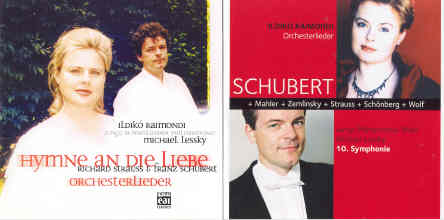

Wörthersee
Classics Festival
Klagenfurt, Carinthia 4-9 June 2003
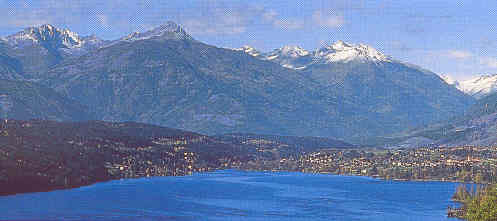
Klagenfurt, the small lakeside city at the heart of Carinthia (locally Kärnten) in southern Austria, is easily reached from London by Ryan Air's low price direct flights, and it hosts one of Europe's newest International Festivals.
There are several particular reasons for British cultural tourists to consider
Wörthersee Classics Festival, promoted by the Austrian Mahler Society
(President, Elena Denisova) in early June.
The festival's musical identity, which will provide a thread of continuity,
at least for the early years, is that five of the very greatest composers happened
to have a close association with the area. For 2003 Prokofiev, on the 50th anniversary
of his death, was also featured, and Russian musicians, some of them previously
ecountered in Antwerp, were prominent in the roster of performing artists.
MAHLER DAY Mahler II - Gilbert Kaplan & Moscow Philharmonic Orchestra
Mahler told Sibelius that, for him, the Symphony contains the whole world.
For Gilbert Kaplan, musical monomaniac extraordinaire, this one symphony
contains his whole musical world. At first an amateur, self-financing conductor,
he met a sceptical critical response when he embarked on his love affair with
Mahler II more than two 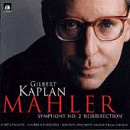 decades
ago. The Vice-President of the Kaplan Foundation told me that he had now conducted
it with some fifty-five different orchestras, and Gilbert Kaplan himself confirmed
to me that he has no plan to conduct any different music. I had not attended
any of Gilbert Kaplan's performances, and he was perplexed that I had come to
Klagenfurt to do so, since he had taken his interpretation to Manchester a few
weeks ago, and was bringing it to London in the autumn. Kaplan's Conifer recording
with the LSO won plaudits and his re-recording of Mahler II, with the Vienna
Philharmonic Orchestra, is to be released in conjunction with that next London
appearance.
decades
ago. The Vice-President of the Kaplan Foundation told me that he had now conducted
it with some fifty-five different orchestras, and Gilbert Kaplan himself confirmed
to me that he has no plan to conduct any different music. I had not attended
any of Gilbert Kaplan's performances, and he was perplexed that I had come to
Klagenfurt to do so, since he had taken his interpretation to Manchester a few
weeks ago, and was bringing it to London in the autumn. Kaplan's Conifer recording
with the LSO won plaudits and his re-recording of Mahler II, with the Vienna
Philharmonic Orchestra, is to be released in conjunction with that next London
appearance.
This opening event of the second Wörthersee Classics Festival, which had
begun modestly in 2002, was special in several ways. The vast Wörtherseehalle
7, normally used for trade exhibitions etc, was specially provided with a platform
and reflectors designed by Manfred Bockelmann for the festival, under the supervision
of acoustician Dr Karl Bernd Quiring, turning an unpromising commercial venue
into an attractive and acoustically ideal space for the audience of a thousand
which filled it - so important an event has Wörthersee Classics quickly
become in the Carinthian cultural calendar. And Kaplan, with a now vast accumulated
knowledge of his chosen subject, was blessed there with ideal and rare conditions
- a great orchestra with which he had been allowed five four-hour rehearsal
sessions in Moscow, before they flew to Klagenfurt the previous evening. Normally
he only gets two three-hour rehearsals.
The reward was self-evident, a perfectly honed account by the Moscow Philharmonic
Orchestra, which had not previously played the work for very many years, nor
was scheduled to give it back at home after this single, thoroughly prepared
performance. A great surprise to me was seeing Gilbert Kaplan the conductor;
very professional, in the manner of Boult, which is in my book high praise.
He takes a long view, underpinned by strong pulse, bringing the listener with
him around all the bends and corners of Mahler's long journey. His beat is clear
and authoritative, the left hand independent and expressive for moulding dynamics,
the arm dropping to his side when he has nothing to say with it. Kaplan's approach
is analytic, a litle cool, alert to every moment, attentive to contrapuntal
exchanges between whole sections, a master of interior orchestral balance. And,
crucially, no imposition of heightened emotion to impress upon us that it was
'his' Mahler II. Fine solo singers Michaela Kaune & Manuela Bress and choirs
from nearby Slovenia, their professional Chamber Choir strengthened by the Consortium
Musicum Choir formed for collaboration in orchestral works,ensured a rousing
finale, marred only by an electronic organ which went berserk and engulfed everyone
else in the very last pages.
The well-known Mahler connection with the area was enhanced by a (rather long) climb, following Mahler's own early morning route from his lakeside base at Mairnigg up to the small, bare composing house in the woods (the cook had to take a different, steeper route to deliver his breakfast so that he would not be distracted by seeing her!). Here, where many of his symphonies were written, we found a small museum and extensive Mahler library cared for by Pierre Velik, knowledgeable devotee, who played us tracks from rare piano recordings by the composer.
ALBAN BERG DAY
The sadnesses of Berg's later life was underlined by a specially arranged visit to the Berg House overlooking Wörthersee where Alban Berg worked on the violin concerto and Lulu (not open to the public; publication of photos of the many memorabilia was forbidden by the Berg Foundation). On Klagenfurt's Alban Berg Day, the Moscow Philharmonic under Peter Keuschnig preceded the concerto with a festival commission, Small Fantasy for Large Orchestra by Nikolaus Fheodoroff, before supporting violinist Elena Denisova representing Manon Gropius, whose untimely death had inspired the work; Berg himself was not fated to live to hear its premiere.
Have those circumstances, and the Bach chorale introduced towards the end, perhaps helped to maintain its secure place in the repertoire? In his very personal programme note Alban Berg and Us, Russian composer Valery Arzoumanov celebrated Berg's refusal to provide clarity and his 'astonishingly opaque instrumentation'! In the first of his introductory talks, which struck exactly the right note, Dr Wilhelm Sinkowicz, chief music critic of Vienna's Die Presse, explained the reticence of the violin part and its submergence at times by the dense orchestral texture as deliberately reflecting the fragility of the young woman depicted in his musical tribute. In the Austrian Radio broadcast of the concert this intended imbalance, if it really was so, is 'rectified' by the balance engineers - essential when one does not have eyes to help the ears - and Elena Denisova's playing comes through more clearly than from where I was sitting in the hall. (In Anne-Sophie Mutter's beautiful recording with James Levine & the Chicago SO, care is taken that it is not over-corrected. For a UK visitor it seemed regrettable that CDs were not available at the events, to augment the experience of the live concerts, particularly desirable for the more 'difficult' composers who are not regularly performed in the locality.)
The Moscow Philharmonic's contribution ended with a roof-raising account of one of their national war-horses, an always effective Romeo & Juliet Suite by Prokofiev.
SUNDAY MATINÉE
Hugo Wolf and Prokofiev featured in one of the festival's unique events, sponsored
by Machold Rare Violins, in which Elena Denisova appeared again to great advantage.
It began with a sparkling, fully idiomatic performance of Hugo Wolf's Italian
Serenade by Anima Quartet, a young group formed in Carinthia which,
on this brief reckoning, shows every prospect of a disti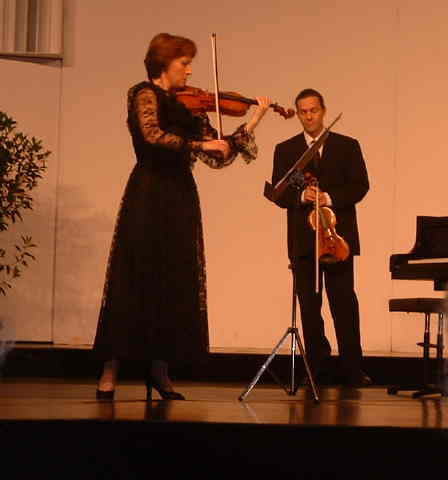
Prof. Dietmar Machold, a famed expert in restoring rare violins, discussed the instruments and working methods of Stradivarius, Guarnarius and other classic violin makers before Elena Denisova and Norwegian violinist Atle Sponberg shared a performance of the Bach solo Partita in E, alternating the movements, she on a Strad, he on a Guarnerius, both lent a few days beforehand from Machold's collection.
No contest nor any conclusion possible! Both sounded magnificent, and the two virtuosi rounded off the morning with a compelling account of a Prokofiev rarity, the sonata for two violins Op 56.
HUGO WOLF DAY - recital by Ildikó Raimondi and Charles Spencer
Wolf's formative years were tied to the Carinthian region, with its repeatedly changing boundaries. He was born in a house which is now a music school in Slovenia, just over the border (I wonder whether and how they celebrate their association with so famous a former resident?). During a difficult, traumatised childhood, he was placed with Benedictine monks in the area, where his musical potential was fostered and flourished. But he was twice expelled for misbehaviour during his schooldays and personality difficulties persisted into adult life, succeeded ultimately by syphilitic mental breakdown.
An undoubted highlight of the festival was one of relatively few Wolf recitals in Austria during this centenary year of the great song composer's death. We learnt that lieder recitals attract only small audiences in Vienna, and that Wolf is not at all popular there. Writing in the progamme book, Dutch composer Jo Sporck attributes his belief that Wolf's centenary 'will only be given its proper due by few people' to his failure to produce an orchestral 'visiting card'. Ildikó Raimondi gave her selection in the original keys, and told me that Hugo Wolf himself rejected all transpositions.
In the context of the recent completion of the long running Wolf Centenary
Festival at London's Wigmore Hall, which .JPG)
No need to take my word for this duo's exceptional quality; their unique Austrian Radio CD of Lieder des Lebens aus vier jahrhundeerten is a complete winner - selections by 23 composers arranged in groups of Childhood Scenes; Pains & Pleasures of Love; Ideals, Dreams & Reality; Saying Goodbye (ORF CD 304 - order from mailto:orfshop@orf.at)*.
BRAHMS and WEBERN DAYS
The Brahms day brought Sabine Meyer (popular clarinettist famous for breaking the BPO's gender barrier!) and Misha Maisky with pianist Pavel Gililov. They joined forces for the clarinet trio after Sabine Meyer gave the F minor sonata and Misha Maisky the infrequently played, and very welcome, cello version in D major of the violin sonata Op 78 in G, which was composed at Wörthersee. But there was no chemistry in this trio nor magic in the duo interactions, so I was driven back to the recording by Czech-born cellist Michaela Fukacova, who I first heard (and never since) at a Scandinavian Festival in London many years ago. She includes it in a recommended Brahms 3-sonata recital recorded at Denmarks Radio (Kontrapunct 32027) with her compatriot Ivan Klansky, a frequent visitor to UK with the Guarneri Trio Prague, a group I never miss.
Webern, who spent his early formative years at Klagenfurt, was rather an odd
man out in the festival scheme, sharing the programm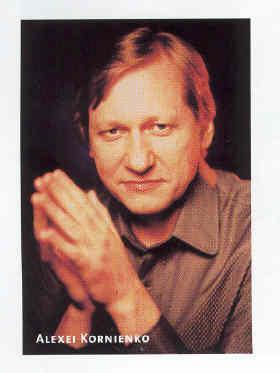 e
with Mozart on the designated Webern Day. The note by composer Anthony Girard,
'not an unconditional admirer of Webern', seemed designed to both identify with
and assuage resistance to this 'difficult' composer. Despite the distinguished
musicologist Dr Wilhelm Sinkowicz's efforts to enthuse us, Webern's symphony
proved a bitter pill for the local audience and during its 11 minutes duration
was accompanied by mutterings of disapproval. Nor would many converts have been
made by the early piano quintet - Webern's teacher Schonberg did not like it;
nor did I.
e
with Mozart on the designated Webern Day. The note by composer Anthony Girard,
'not an unconditional admirer of Webern', seemed designed to both identify with
and assuage resistance to this 'difficult' composer. Despite the distinguished
musicologist Dr Wilhelm Sinkowicz's efforts to enthuse us, Webern's symphony
proved a bitter pill for the local audience and during its 11 minutes duration
was accompanied by mutterings of disapproval. Nor would many converts have been
made by the early piano quintet - Webern's teacher Schonberg did not like it;
nor did I.
They were entrusted to I Virtuosi Italiani (Modena) under the supervision of the festival's Artistic Director, conductor/pianist Alexei Kornienko, a contemporary music specialist. This last concert was completed with Mozart's Piano Concerto in A K414, in the version with strings, and an alert, sparkling account of Symphony No 29 to bring the whole festival to a happy conclusion.
Dr Peter Grahame Woolf
Musical Holiday Pointers
Ryanair has opened up a beautiful and fascinating area with cultural roots stretching back to pre-roman times. Evidence of Carinthia's long history abounds everywhere in settlements, castles and churches throughout the countryside, and in its capital Klagenfurt which is replete with well preserved Italianate and baroque style buildings. The area is ringed by mountains, yet basks in Mediterranean warmth. You can see why great composers like Mahler and Brahms found the peace and beauty of this area conducive for creative work.
The initiative to establish a music festival in these propitious surroundings provides the icing on a luscious cake. The success of this venture in this its 2nd year, attests to its acceptance by a music-loving local population. Given its ambitious and high artistic standards, and its advantageous location in beautiful surroundings, it should also attract visitors from further afield. Indeed, it is no more difficult for music lovers, probably no more expensive and considerably less hectic to visit the Wörthersee Classics Festival than to venture North within the UK from the South East of England to the popular Edinburgh Festival.
We 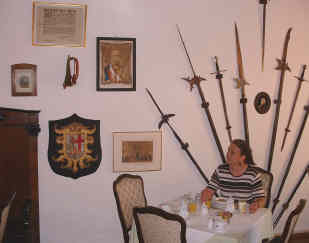 stayed
very comfortably in the characterful old castle Hotel
Schloß St. Georgen B&B, only 10 minutes walking distance from
Klagenfurt Airport, as is the town centre by bus the other way. The large hotel
grounds are packed with mature trees and we made good use of a small swimming
pool at the bottom of the orchard. A medieval knight in full armour presides
over the dining room, and in the hotel's private chapel a monk is in a permanent
state of prayer (maybe he will yet save
stayed
very comfortably in the characterful old castle Hotel
Schloß St. Georgen B&B, only 10 minutes walking distance from
Klagenfurt Airport, as is the town centre by bus the other way. The large hotel
grounds are packed with mature trees and we made good use of a small swimming
pool at the bottom of the orchard. A medieval knight in full armour presides
over the dining room, and in the hotel's private chapel a monk is in a permanent
state of prayer (maybe he will yet save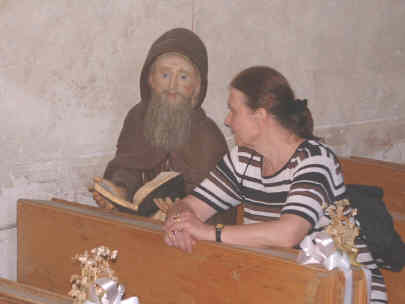 the world from all its follies)!
the world from all its follies)!
Aircraft noise was not a problem; only a few and small planes use its runway and could not drown out vociferous cuckoos, croaking frogs, clucking chickens and the occasional mooing cow. A place we would recommend for a peaceful stay in this beautiful wooded area crisscrossed with paths for walking. Car hire would extend the possibilities for exploring further afield independently.
The festival has already outgrown the town's theatre, which is also used for operas and concerts. A trade hall has been adapted with great ingenuity and expertise, under the advice of acoustician Dr. K B Quiring, to create a functional concert hall with excellent acoustics, an adaptable performance space which can be tailored to different types of music and audience numbers. Some artists may find the acoustics somewhat dry, but for the audience the clarity and warmth of tone which has been achieved is truly astonishing - a model to be studied by other communities who feel they cannot afford a new purpose-built 'proper' concert hall. A spacious covered bar area, with drinks and good quality snacks modestly priced, helps to make the audience feel welcome and comfortable. There is evidence of an enormous amount of devoted effort by very many people and a courteous, friendly atmosphere prevailed.
We are grateful for the friendly hospitality we received, including the transfers back to our hotel after the concerts - buses stop very early - and wish the Wörthersee Classics Festival well. It deserves to succeed.
Alexa Woolf BA Hons, MA
Notes: For other international festivals recommended
for musical holdays, see our reports from e.g. Lucerne,
Geneva,
Cork,
Amsterdam,
Antwerp,Strasbourg,
Stuttgart,
Munich,
Lisbon,
San Sebastian,
Rhodes.
Related Recordings: We went to Klagenfurt partly on account of respect for Elena Denisova, having heard her live in Antwerp and subsequently on a number of superlative CDs:-
http://www.musicweb-international.com/SandH/2001/Nov01/Flanders.htm " - - A generous number of CDs were presented to Seen&Heard at Antwerp
- - extremely desirable, all six of them to be warmly recommended, are those
involving violinist Elena Denisova and her pianist/conductor husband 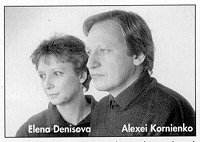 Alexei
Kornienko, who have trawled interesting unusual repertoire and deliver well-recorded
performances of superb accomplishment and attention to detail; those gifted
musicians should be invited to perform in UK urgently!
Alexei
Kornienko, who have trawled interesting unusual repertoire and deliver well-recorded
performances of superb accomplishment and attention to detail; those gifted
musicians should be invited to perform in UK urgently!
Denisova is a top, world class player, but her husband too shows himself equally
a perceptive "pianists' pianist" and a far from reticent chamber music
partner - not an accompanist who would be content to have his piano lid on the
'short stick'! Together, they have a great hit with a programme of Miniatures
for Violin & Piano arranged by Jascha Heifetz, Arte Nova 74321 72124-2
[review]
, played on both instruments with easy, relaxed musicality, subsuming virtuosity
but without drawing it to forward attention. We played it straight through with
pleasure in the sequence, which is by no means one of mostly 'show off' pieces.
Gorgeous! Rapport and balance are notably good there, and equally so on ORF
Extraplatte EX 408-2 by Schnittke, Kollontaj, Fheodoroff & Buckinx (with
cellist Josef Podhoransky) and in seven works by Jo Sporck on Et'Cetera KTC
1234 (Denisova & Kornienko with a different cellist, Grigori Alumian)
This composer portrait CD includes Space 1 (heard in Antwerp), and he
is now fixed firmly in my mind as an accomplished and individual Netherlands
composer.
On her solo CD, Et'Cetera KTC 1236, Elena Denisova gives a fine, fully competitive account of the Bach D minor Partita (with Chaconne) and couples it with a major 35 mins. unaccompanied Partita Testament by Mikhail Kollontaj, which is related to the events of Golgotha in terms of a Russian-Orthodox-Church interpretation. She plays music for violin and organ by Rheinberger on Arte Nova 74321 58965-2, Six pieces Op 150 and Suite Op. 166, unusual novelties. She can be heard as soloist, concertmaster and as leader of the National Quartet of Moscow, with the Collegium Musicum Carinthia, conducted by Alexei Kornienko, as they were at Antwerp, in Hemera HCD 2926, a CD of Musica Concertante from the Trondheim Composers Group by Albertsen, Kleiberg, Bottcher & Bjorklund.
*Our high regard for Ildikó Raimondi has been further enhanced by two CDS of orchestral songs by Strauss and Schubert etc, recorded in association with Austrian Radio with the excellent Junge Philharmonie Wien conducted by Michael Lessky. She is captivating in Schubert and ravishing in Strauss! The Schubert disc also includes a winning performance of his incomplete 10th Symphony as realised by Brian Newbold. All three of Ildikó Raimondi's CDs are well worth seeking out and we hope to hear her soon in a London recital at Wigmore Hall, and with orchestra at RFH or the Barbican. (PGW & AW)
